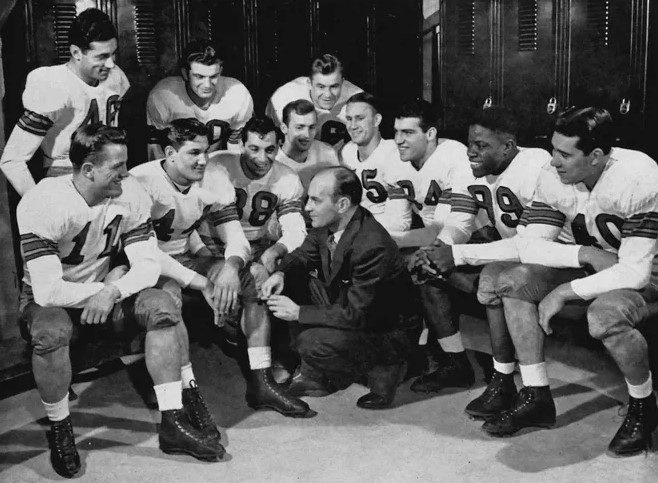|
Football Short Story
It Ain't Over 'Til It's Over
Paul Brown's third Ohio State football team had a 2-5 record as they faced Illinois in the second-to-last game of the 1943 regular season.
Ripley's "Believe It or Not" had a field day for years with our game against Illinois because we were allowed to kick a field goal and win after time had expired. With the score tied, 26-26, we had tried to pass on the game's final play, and it had failed. When the gun went off, both teams went to their dressing rooms thinking the game was over, but only Russ Walker, a caption writer for the Columbus Dispatch, who had been working along the sidelines with his photographer, had seen what had happened before the gun: One of the officials had dropped a penalty flag.
Russ was a high school official, and he knew a game could not end with a defensive foul. The official who had thrown the flag, I found out later, saw everyone run off the field and just stuffed it back into his pocket, content to allow the game to end without enforcing the penalty. Russ told Jim Masker, the referee, about the penalty, and checking with the official, Jim found it had been against Illinois.
 Paul Brown with members of his 1942 Ohio State national champions He came to our dressing room as I was talking to our players, knocked on the door and poked his head inside.
"Coach," he said, "could I talk to you a moment?"
"Sure," I said and moved over to the door.
"The game has ended in a foul, and you have the right to one more play," he told me. "Illinois was offside, and you can accept the penalty and take the extra play if you want it."
"We'll take it; it's our play," I replied immediately, without thinking.
I knew that we would get the ball within field goal range and that it could well be our only play. Our kicker was a seventeen-year-old kid named Johnny Stungis, and it never occurred to me until we were walking out of our dressing room that John had kicked extra points but had never kicked a field goal. It also never occurred to me until that moment that Illinois could block the field goal attempt and run with the loose ball for a touchdown. A tie would have been better than a loss, but I dismissed the possibility and decided to go for the victory.
On the way down to the field I said to Stungis, "John, I never missed a field goal in my life."
"No kidding, coach," he said, very seriously. "Did you kick many?"
"No," I said, "I never even tried to kick one."
We both laughed, and that might have eased some of the pressure. About a third of the crowd was still in the stands, and they were stunned to see both teams returning to the field. It was a peculiar site, the players, some of them in uniform, some partially undressed, standing behind the end zone with the spectators, everyone watching the officials respot the ball where they thought it should be.
Illinois had been penetrating well against our kickers, so I warned the eleven men on our field goal team, "You understand that they could break through and block this kick, recover it and run with it, so this can boomerang on us, too. Let's be particularly tight and solid at every position when we line up."
They nodded, and as I walked toward the end zone, the crowd that had jammed behind the goal posts formed an optical illusion so that the distance from where Stungis would kick the ball actually looked shorter. I prayed that it would prove to be no illusion. When Johnny kicked, I watched the ball and then turned and said to Carroll Widdoes, "I think the darn thing went over."
The next moment I was being hoisted into the air by excited fans because the kick had indeed been good, and we had won the game, 29-26. Ray Eliot, the Illinois coach, never reconciled himself to that loss because he claimed the officials erred in our favor in respotting the ball for the kick. I can't blame him for feeling bad, but in those days we were in such dire need of a victory that it didn't make any difference how we got one.
For years afterward I answered phone calls and settled bets on that game because people just couldn't believe something like this could happen. Ironically, two weeks before, Stungis had kicked what had looked like the winning point against Indiana to give us a 14-13 lead with two minutes to play, only to have Bob Hoernchmeyer throw a touchdown pass to Don Mangold in the final 32 seconds for the Hoosier victory.
|